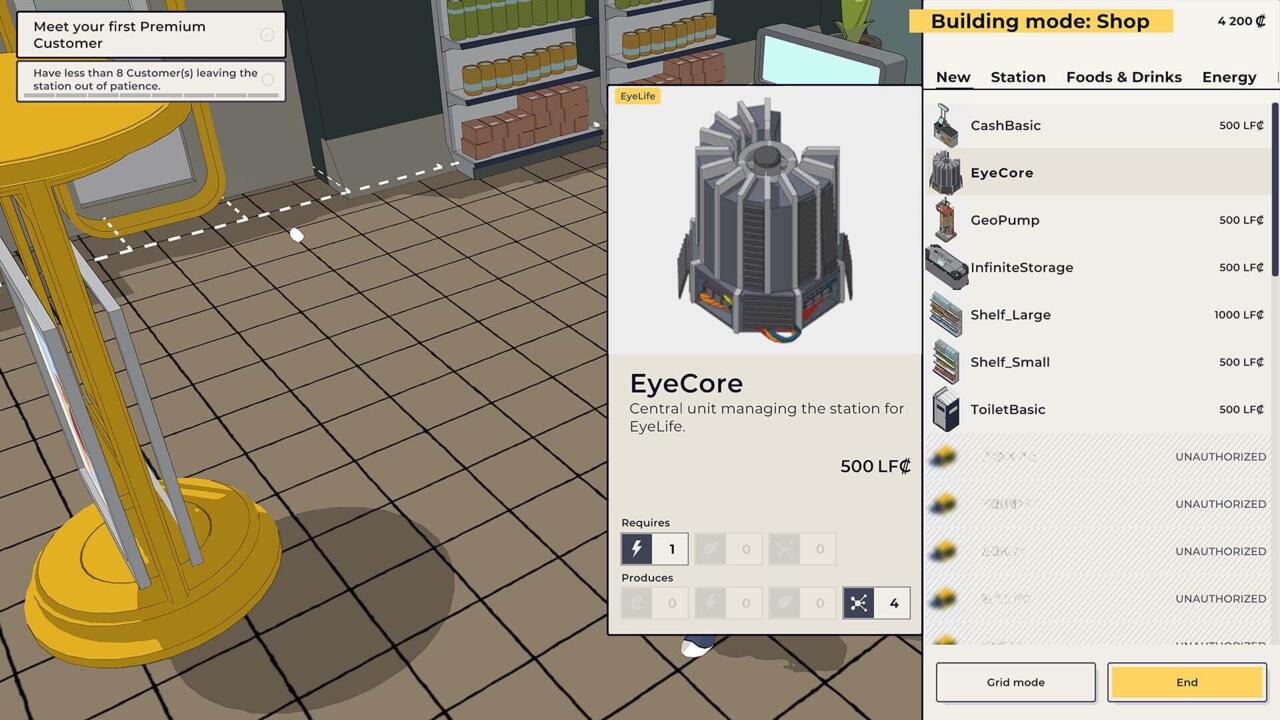Buy Junk Food, New Organs, And Clone Yourself At The Gas Station Of The Future In Flat Eye
America’s gas stations aren’t always pretty to look at. They can often be a grimey lens into people’s most basic, and at times, unflattering needs. We rely on them when we’re desperate for a bathroom, or when we need to buy junk food, cigarettes, questionable beer, and a lottery ticket to pin hopes and dreams on before filling our car with gas and speeding off like we were never there to begin with.
Developer Monkey Moon’s new game, Flat Eye, looks at the gas station of the future–a very believable, even dystopian, future.
It takes place in a world on the brink of becoming a utopia, one where machines are sufficient replacements for human labor. Think self-checkouts, self-cleaning toilets, kiosks that take your order, and machines that make your breakfast sandwich before popping it out a little window. It’s a world where you seldom have to come face-to-face with a working human being.
In this alternate future, gas stations (branded as Flat Eyes) are still the place where you get junk food, gas, and use the bathroom, but it’s also where entirely new technology is used and showcased, so Flat Eyes are also referred to as “automobile fill-up stations and technological access points.” So as well as filling up gas and buying bad hot dogs, you can buy new organs from an organ vending machine, receive medical treatment from an automated medical module, or even clone yourself.
The game is a management sim where you overlook the needs and expansion of a Flat Eye location, where you point-and-click from an overhead view (though the camera is fully moveable), clicking on modules, and dragging and dropping things in place on a grid-like layout. In my short hands-on demo, I ordered a human employee to restock the shelves, repair equipment, and install new amenities like toilets, self-checkouts, and medical modules, all while cashing out other customers in the process. The customers are depicted as colorful, albeit characterless, silhouettes that scurried in and out to use the bathroom or cash out.
Flat Eye takes a hard look at humanity’s increasing dependency on technology. It depicts a scenario in which humans themselves become as automated and as mechanical as the very machines they rely on to exist through their day-to-day lives. Despite its bleak view of a possible future, developer Monkey Moon was clear in conveying it wanted to ultimately tell a positive story of humanity. Humans embody more of a machine-like presence in Flat Eye, operating on autopilot through a clean, perfect-looking world. But it’s still not without its distinct characters and personalities.
As you manage Flat Eye, special customers will visit, giving you the opportunity to talk to them and navigate branching conversations that present glimpses into the lives of those who inhabit this pseudo-utopian world. When I had initially felt like a floating manager ordering around an employee, these branching conversations had suddenly felt intimate as I was choosing the employee’s responses. It’s also during these conversations where you interact with Flat Eye’s AI, a character that I will not spoil, but one I anticipate will have a strong role in the game’s somewhat mysterious narrative.
It’s in the introduction to this AI and the conversation with it that I was left most eager to see where Flat Eye will go next. There’s a dual narrative working alongside an already interesting management sim here.
At the end of each day, you are able to dive into the data of the Flat Eye’s productivity and receive an overall score for how well you did. It’s also during the transition between days that you’ll have an opportunity to look through emails from Flat Eye’s corporate executives and look at messages within the company sent between other gas stations–a humanizing element in a rather detached position as a lowly clerk.

Gallery
Developer Monkey Moon is building a knack for telling stories through the lens of working-class characters that rarely get the spotlight in games. In its previous title, Night Call, you played as a cab driver in Paris, hearing the stories of his passengers, engaging in conversation, and divulging in the intricacies of people’s most intimate stories. But like Flat Eye, Night Call goes beyond its surface level, with layered narratives and themes at play throughout.
Despite my short time with the game, its concepts, themes, and mechanics clicked instantly. Furthermore, seeds were planted for a greater overarching story that seems to be heading towards a redemptive look at a dystopian future.
For all the latest Games News Click Here
For the latest news and updates, follow us on Google News.

